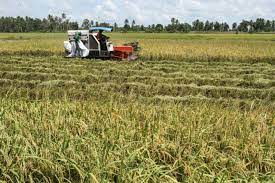The Indonesian government has set an ambitious goal to achieve food self-sufficiency within the next four to five years, with a focus on eliminating rice imports by next year. However, the question remains: is this target realistic?
Arief Prasetyo Adi, Head of the National Food Agency (Bapanas), expressed confidence in the government's ability to reach this goal, citing that Indonesia has already achieved self-sufficiency in several food commodities, such as chicken meat and eggs. "Indonesia has produced over 30 million tons of rice, which is enough to meet the country's consumption needs," he said during the CNN Indonesia Business Summit on December 20, 2024.
Arief emphasized that the success of achieving food self-sufficiency relies on the collective efforts of stakeholders in the food sector to boost production. He also mentioned that the National Food Agency, along with Bulog (Indonesia's state logistics agency), is ready to purchase surplus crops from farmers to maintain stable prices and support domestic production.
The government’s optimism is backed by data, with a current rice production of 30.5 million tons, which has been stable for several years. Arief also pointed out that, according to the Food and Agriculture Organization (FAO), producing 90% of a country’s food domestically is considered food self-sufficiency. "But we aim to do even better," he added.
Sudaryono, Indonesia’s Deputy Minister of Agriculture, outlined the government’s strategies to enhance production, starting with intensification efforts. These include improving rain-fed paddy fields and managing swamp land to increase yield. "We are making rain-fed fields more productive by irrigating them and reducing water levels in swamp land to ensure crops can be harvested multiple times a year," he explained.
According to data from the Central Bureau of Statistics (BPS), optimizing swamp land and rain-fed rice fields has already resulted in an additional 1.7 million hectares of productive land. This increase could potentially add 5 million tons to the national rice supply.
In addition to intensification, the government is also focused on expansion, or extensification, through the creation of new rice fields. This will further increase domestic rice production in the coming years, giving hope to the target of achieving food self-sufficiency by 2028.
Former Minister of Agriculture, Anton Apriyantono, supported the government's efforts, highlighting the importance of well-designed programs that are targeted and effective. He also stressed the need for skilled agricultural extension workers (PPL) to assist farmers in improving their yields. "The welfare and transportation of these workers must also be prioritized to enhance their effectiveness," he noted.
A significant challenge remains in providing financing for small-scale farmers, many of whom struggle to access bank loans. Anton emphasized the need for new credit schemes to help these farmers increase their production capacity.
With President Prabowo preparing to sign four Presidential Regulations on agricultural policies—including those on irrigation, subsidized fertilizers, and agricultural extension services—Indonesia is taking substantial steps toward its goal of food self-sufficiency by 2028. The question remains: can these efforts lead to lasting success, and will Indonesia truly stop importing rice in the near future?
DETIK/CNBCINDONESIA
Read More






 Wednesday, 04-02-26
Wednesday, 04-02-26







